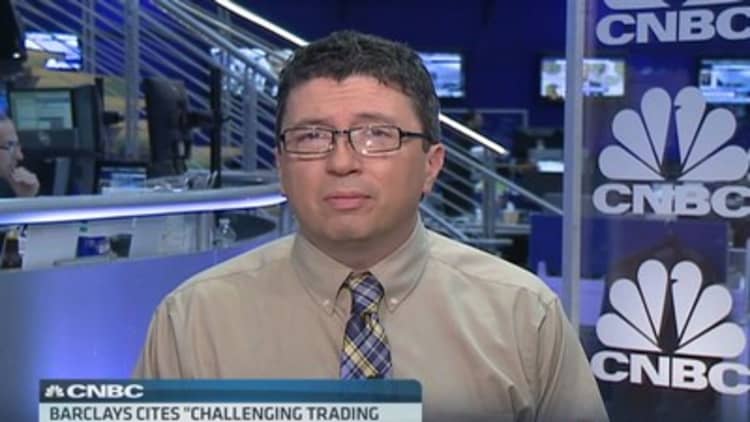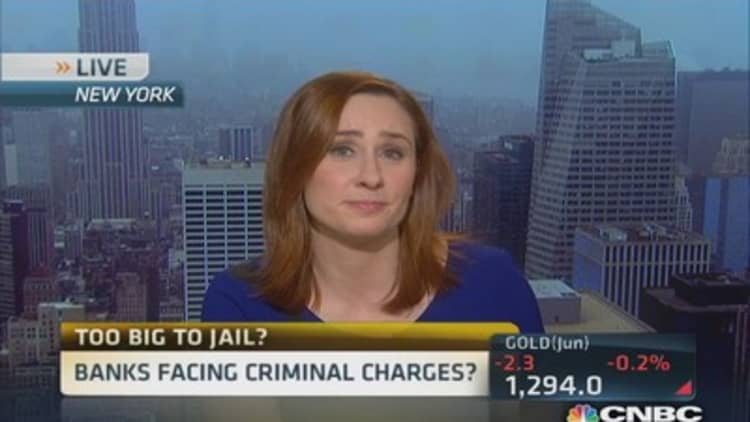
These are not happy days for big banks whether on Wall Street or Fleet Street.
There's been a steady stream of negative headlines suggesting that five years after the end of the financial crisis, the bell finally may be tolling for too-big-to-fail financial institutions.
Consider:
- JPMorgan Chase and Barclays both have announced huge first-quarter trading declines—20 percent and 41 percent respectively—and others are expected to follow suit. Barclays said it will begin a massive layoff program in which it will lose 19,000 employees over the next two and a half years.
- Fines from regulators continue to pile up stemming from crisis-era bad behavior. The latest domino looks to be Bank of America, which could have to pay a levy in excess of the $13 billion already extracted from JPMorgan.
- Recent leaks in major publications indicate that Credit Suisse is nearing a settlement that will see it plead guilty to criminal charges for aiding its customers in avoiding taxes; BNP Paribas also faces possible sanctions from the U.S. for dealing with countries on an embargo list—with the end result likely being in excess of $1 billion in penalties.
All told, this is not a great time to be running a major global financial institution.
Read MoreMorgan Stanley CEO: Investment banking is over
In a message delivered on the Justice Department web site earlier this week, U.S. Attorney General Eric Holder made clear his position on large banks.
"There is no such thing as too big to jail," Holder said. "Some have used that phrase to describe the theory that certain financial institutions, even if they engage in criminal misconduct, should be considered immune to the sheer size and their influence on the economy. That view is mistaken and it's a view that's been rejected by the Department of Justice."
Read MoreHolder's 'too big to jail' warning sparks criticism
But banking problems stem deeper than legal issues, which in themselves are onerous.
On several levels there are some fundamental shifts that are happening in the way these big financial supermarkets do business. In such an environment, only those institutions with a willingness and ability to adapt are likely to flourish.
"You're really seeing banks having to be in the top tiers of areas they're competing in to" do well, said Brian Kleinhanzl, an analyst at financial services firm Keefe, Bruyette & Woods. "Given the decline in trade volume it's not unexpected to see banks pulling away from the market. It's also creating opportunity."
Read MoreJPMorgan sees markets revenue declining 20%
Kleinhanzl believes some of the business factors impacting banks are cyclical in nature. Low volatility across asset classes and bargain basement interest rates courtesy of the Federal Reserve have helped keep a lid on some of the activities in which investment banking thrives, conditions he expects to change as the Fed withdraws its historically high level of financial accommodation.
Conversely, deal-making has helped heal some of the banks' wounds.
Mergers and acquisitions targeted at U.S. companies are up 35 percent on an annualized basis year to date, according to Dealogic. All U.S. M&A activity has surged 63 percent in the U.S. and 93 percent globally, Thomson Reuters reported in its latest investment banking scorecard.
To that end, Goldman Sachs and Morgan Stanley have done well as they have enough versatility to handle a changing climate.

"You would expect those banks that are well-capitalized and aren't in the middle of large reorganizations to probably do well," Kleinhanzl said. "That would be the Goldman Sachses, the Morgan Stanleys of the world. Those are two that could take share, those are two that remain pure investment banks."
As for the problems with trading, the issues extend beyond the low-rate, low volatility environment. The rise of high-frequency trading and other platforms has eaten into profits as well.
Read MoreFidelity, Scottradedeny clients anti-HFT choice
"The development of electronic trading platforms and the exchanges leads a lower demand in (over-the-counter) markets which are operated by these investment banks," Lei Mao, assistant professor of finance at Warwick Business School in Coventry, UK, said in an email interview.
"When different kinds of instruments are readily available in an exchange, for example, derivatives on interest rates, investors do not need the investment banks to construct a structured product for them—they do the structuring by themselves, aided by computerized trading system(s). I would speculate that this loss of demand of structured products in OTC markets is a long-run trend, which will hit all investment banks," Mao added.
Consequently, Barclays, UBS, Credit Suisse and RBS have announced cuts to their investment banking businesses.
In Credit Suisse's case, the troubles don't stop there.
The bank is under the gun for allegedly helping its U.S. clients avoid paying taxes, with a criminal settlement looming that will see the institution pay a fine in the neighborhood of $1.6 billion.
Read MoreUS govt, Credit Suisse near $1B deal: Source
That won't be the worst of it though—the bank could have trouble maintaining its standing on the world stage following the guilty plea.
In a note to clients, banking analyst Dick Bove at Rafferty Capital Markets said that if news reports of the settlement are true, "at the most, the bank will never function again as a major player in the global financial system...No financial company to this point has been able to handle such charges."
A Credit Suisse spokesman declined to comment for this report. However, Chairman Urs Rohner was slated to tell shareholders Friday that the bank was working through its legal troubles.
"We are doing everything we can to resolve this matter within the given framework of U.S. and Swiss law, in the best possible way and in a timely manner," Rohner was expected to tell the Swiss bank's annual shareholders' meeting, according to prepared remarks reported by Reuters.
Bove, though, has bitterly decried the government's push against banks, citing Attorney General Holder's videotaped statement specifically as an effort to start an international "bank war."
"If the bank regulators act upon their threat to criminally indict two European banks (Credit Suisse and BNP Paribas), expect universal and investment bank stock prices to plunge," Bove said. "It may be politically desirable to do this in the United States. Not so in Europe; there will be a reaction from foreign authorities that even the United States may understand. It may finally understand that it is going too far. These two banks are definitely too big to jail. Live with it."






